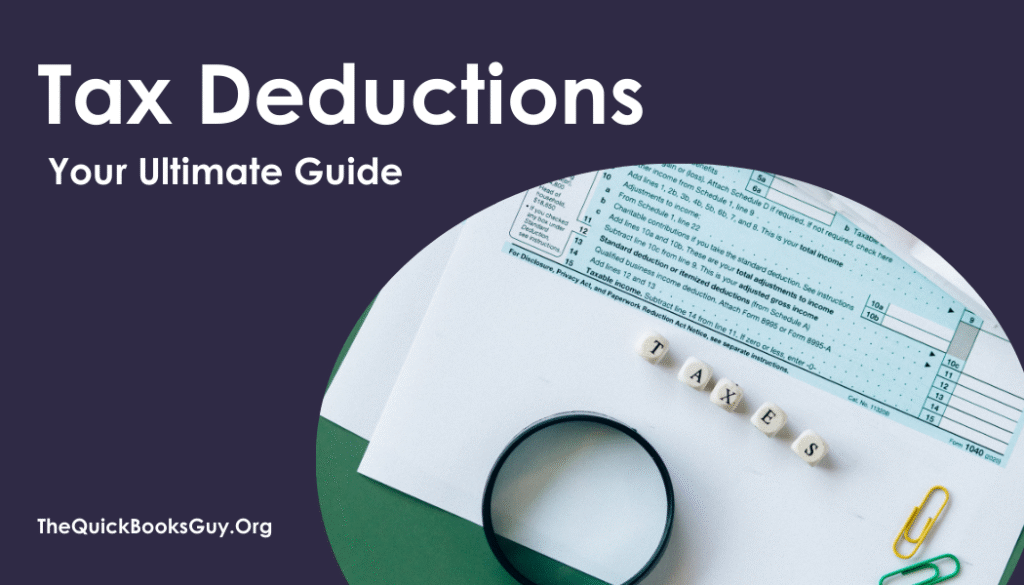
Tax season can be a stressful time for small business owners, but understanding what you can deduct can make a significant difference in your tax liability. Deductions are expenses that the IRS allows you to subtract from your income, reducing your overall taxable income. Knowing what to deduct is crucial for optimizing your tax savings and keeping more of your hard-earned money in your pocket. In this ultimate guide, we’ll walk you through the most common and essential deductions that small businesses can claim.
1. Home Office Deduction
If you use a part of your home exclusively for business purposes, you may be eligible for the home office deduction. This deduction allows you to deduct a portion of your mortgage interest, rent, utilities, and other related expenses. The space must be your principal place of business or a place where you regularly meet with clients.
There are two methods to calculate the home office deduction:
- Simplified Method: Deduct $5 per square foot of the home used for business, up to a maximum of 300 square feet.
- Actual Expense Method: Calculate the percentage of your home devoted to business use and deduct the corresponding portion of your actual expenses.
2. Business Vehicle Expenses
If you use your vehicle for business purposes, you can deduct vehicle-related expenses. There are two methods to calculate your deduction:
- Standard Mileage Rate: Deduct a set amount per mile driven for business (the rate is set by the IRS each year).
- Actual Expense Method: Deduct the actual expenses incurred, including gas, maintenance, insurance, and depreciation.
Keep detailed records of your mileage and expenses to ensure accurate deductions.
3. Office Supplies and Equipment
Any supplies or equipment you purchase for your business can be deducted as a business expense. This includes items like paper, ink, computers, software, and office furniture. For larger purchases like equipment, you may be able to take advantage of Section 179, which allows you to deduct the full cost of the equipment in the year it was purchased, rather than depreciating it over several years.
4. Business Meals
You can deduct 50% of the cost of meals directly related to your business. This includes meals with clients, prospects, or employees. The IRS requires that the meal must not be lavish or extravagant and must be necessary for your business. Keep receipts and note the business purpose of each meal for your records.
5. Travel Expenses
If you travel for business, you can deduct travel expenses such as airfare, hotel stays, rental cars, meals, and even dry cleaning. However, the trip must be primarily for business purposes. If a trip is partly business and partly personal, you can only deduct the portion of the expenses related to business.
6. Advertising and Marketing
Any expenses related to promoting your business are fully deductible. This includes costs for online ads, social media campaigns, print ads, billboards, business cards, and even the cost of sponsoring local events. Investing in advertising is not only crucial for growing your business but also provides valuable tax deductions.
7. Professional Services
Fees paid to accountants, lawyers, consultants, and other professionals who provide services to your business are deductible. This includes fees for tax preparation, legal advice, and business consulting. It’s essential to keep receipts and invoices for these services, as they can add up to significant deductions.
8. Employee Salaries and Benefits
If you have employees, you can deduct their salaries, wages, bonuses, and commissions. Additionally, the cost of employee benefits such as health insurance, retirement contributions, and education assistance can be deducted. Paying employees a fair wage and offering benefits not only helps attract and retain talent but also provides valuable deductions for your business.
9. Insurance Premiums
Premiums paid for business insurance, such as liability insurance, workers’ compensation, and property insurance, are fully deductible. If you’re self-employed, you may also be able to deduct the cost of your health insurance premiums, although there are specific rules and limitations that apply.
10. Interest on Business Loans
If you’ve taken out a loan for your business, the interest paid on that loan is deductible. This includes interest on business credit cards, lines of credit, and loans for equipment or real estate. However, the funds must be used for business purposes, and you must have a legal obligation to pay the interest.
11. Depreciation of Assets
Depreciation allows you to spread the cost of a large purchase over its useful life. For example, if you buy a piece of machinery, you can deduct a portion of its cost each year over its expected lifespan. The IRS provides guidelines on the useful life of various assets, and it’s essential to follow these guidelines to maximize your deductions.
12. Rent on Business Property
If you rent an office, storefront, or other business property, the rent you pay is fully deductible. This includes any associated expenses, such as utilities, maintenance, and property taxes if you’re responsible for them. Renting can be a significant expense for small businesses, so taking full advantage of this deduction is essential.
13. Education and Training
Expenses related to improving your skills or those of your employees can be deducted. This includes the cost of attending seminars, workshops, courses, and even books and materials related to your field. Investing in education not only enhances your business capabilities but also reduces your taxable income.
14. Bad Debts
If you’ve extended credit to a customer or client and are unable to collect payment, you may be able to deduct the amount as a bad debt. This is particularly relevant for businesses that offer services or goods on credit. It’s essential to show that you’ve made reasonable efforts to collect the debt before claiming it as a deduction.
15. Charitable Contributions
Donations made by your business to qualified charitable organizations are deductible. This includes cash donations, as well as the fair market value of donated goods or services. Supporting charitable causes not only benefits the community but also provides a tax incentive for your business.
16. Licenses and Permits
Any fees paid for business licenses, permits, or certifications required to operate your business are deductible. These are necessary expenses to keep your business compliant with local, state, and federal regulations, and they can be deducted in the year they are paid.
Conclusion
Maximizing your deductions is one of the best ways to keep more money in your business, allowing you to invest in growth, pay yourself a fair salary, and contribute to the success of your enterprise. Keep this guide handy as a reference throughout the year, and make tax season a less stressful and more rewarding experience.
Not ready to do it on your own
The QuickBooks Guy offers not just bookkeeping services but a partnership in your financial journey. With a deep understanding of QuickBooks and a commitment to personalized service, ‘The QuickBooks Guy’ is your ally in navigating the complexities of financial management. By choosing us, you ensure that your business’s financial health is in capable hands, allowing you to focus on growing your business.
Don’t let bookkeeping challenges hold you back any longer. Reach out today at 678-923-5904 or drop an email to TheQuickBooksGuy@gmail.com.




